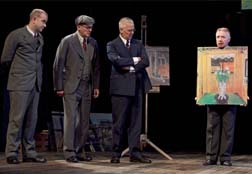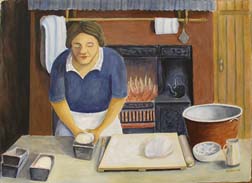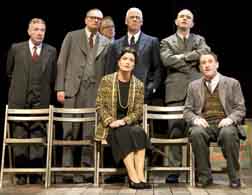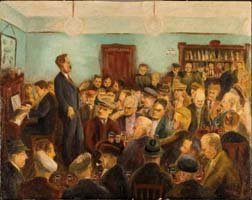By Lucy Komisar
This engrossing play starts in 1934 Britain, when over a million men worked brutally hard ten-hour days in coal mines at standard survival wages. The back story is that some miners, who started in the pits at 11 and were deprived of education, had prodigious artistic talent. And probably other natural gifts as well, if only they’d had the chance to develop them. We get to see their paintings in this inventive production by director Max Robert that audiences will savor.
Think of this powerful story as a prequel to Billy Elliot. Lee Hall wrote both plays and achieved in them a strong convergence of culture and politics. In Billy Elliot, which occurs in 1984-85 during the famous British miner’s strike, the 11-year-old son of a miner wants to be a ballet dancer. His father initially opposes it, but in the end he and the community support Billy out of miners’ solidarity.

Here, half a century earlier, the mine workers educational association organizes an art class. It hires Robert Lyon (Ian Kelly), a professor at a college in Newcastle, who arrives with a batch of High Renaissance art history slides (Michelangelo, da Vinci etc.) and when that doesn’t go over with men who’ve never been to a museum, realizes that the way to teach them art is to teach them to paint. It’s a real story, based on a group of miner-painters who were known as the Ashington Group and exhibited in England, Europe and China.
They start out in a grubby hall, all scrubbed clean and dressed in suits — the first surprise, since that’s not normal artists’ garb. Harry Wilson (the wonderfully resolute Michael Hodgson) is a dental mechanic and a Marxist, who will educate/harangue the group throughout about the political context of their artistic endeavors. At the other end of the spectrum – the bureaucratic one – is George Brown (Beka Walmsley), the officious organizer of the class. The actors are first-rate, a perfect ensemble as were the characters they portray.

One miner, Jimmy Floyd (David Whitaker), tells how he started at 10 years old to open and shut the doors separating the mine tunnels. A few years ago, I visited a mine in Wales where a retired miner took us into the pit and showed us how that worked. The children sat in pitch dark for hours; when a miner with a lighted helmet arrived, they opened the door, and then sat back again into darkness. Jimmy turns out to be a fine artist.

Another miner we learn more about is Oliver Kilbourn (the impressive Christopher Connel), a fellow in an ill-fitting suit who like the others started in the mines as a child. His accent is so heavy, you need the subtitles. We see his works, like some of the others, on large screens that fill the backdrop as the dialogue ranges over the philosophy of art – and life.
In four years, they will have their

first exhibit. They also get a patron, the heiress Helen Sutherland (Philippa Wilson), who presents Oliver with a dilemma when she offers him a stipend to give up mining and just do art. It appears to him that accepting it would be a betrayal of his class.
The story is as much about politics as art. Professor Lyons wants Olivier to be angry at the chances he hasn’t had. He wants him to work to change the world. When this war is over there’s a chance that we can actually do something, but it can only happen if the working classes get off their fat arses and their fucking high horses and use their power, their intelligence and their creativity, Oliver, and reach for a better future. He declares, You can’t have a rich culture if three quarters of the population are disenfranchised.

In 1947, at the war’s end, the Labor Party nationalizes the mining industry. In The Pitmen Painters, we see a hopeful National Union of Mine Workers banner that says Forward to Socialism. Nearly 40 years later, Billy Elliot tells how that dream was shattered, with the closing of the mines and the destruction of the union by corporate power represented by British Prime Minister Maggie Thatcher.
Still, the spirit of the miners lives on, in the art of the Pitmen Painters, while Maggie Thatcher turns into an icon of British political meanness.
The Pitmen Painters. Written by Lee Hall from a book by William Feaver; directed by Max Roberts. Manhattan Theatre Club at Samuel J. Friedman Theatre, 261 West 47th Street, New York City. Opened September 30, 2010; closes December 12, 2010. 212-239-6200. http://www.manhattantheatreclub.com/current-season/pitmenpainters/default.asp

